The very thought of getting into real estate investing can be overwhelming. There’s a lot of work involved in finding the right property, not to mention the many expenses involved with purchasing real estate. On top of this, you have to worry about finding good tenants and being a landlord.
You can avoid the hassle and the expense by joining one or more real estate investment apps. Just download the app on your phone and invest a few dollars(or more). These crowdfunded real estate platforms are available for every possible situation and financial level, so you can begin right now even if you don’t have the funds for a traditional downpayment.
New real estate investment apps are constantly popping up, so you don’t have to worry about finding the right platform for your financial situation and level of expertise. To help, I’ve compiled the following list of the best real estate investing apps.
Table of Contents
Best Real Estate Investing Apps
Roofstock: Best Overall
Arrived Homes: Best for Rental Properties
Fundrise: Best for Beginners
RealtyMogul: Best for REITs
CrowdStreet: Best for Commercial Real Estate
Acretrader: Best for Farmland
Groundfloor: Best for High Liquidity
Yieldstreet: Best for Alternative investments
HappyNest: Best for Simplicity
1. Roofstock
Best Overall
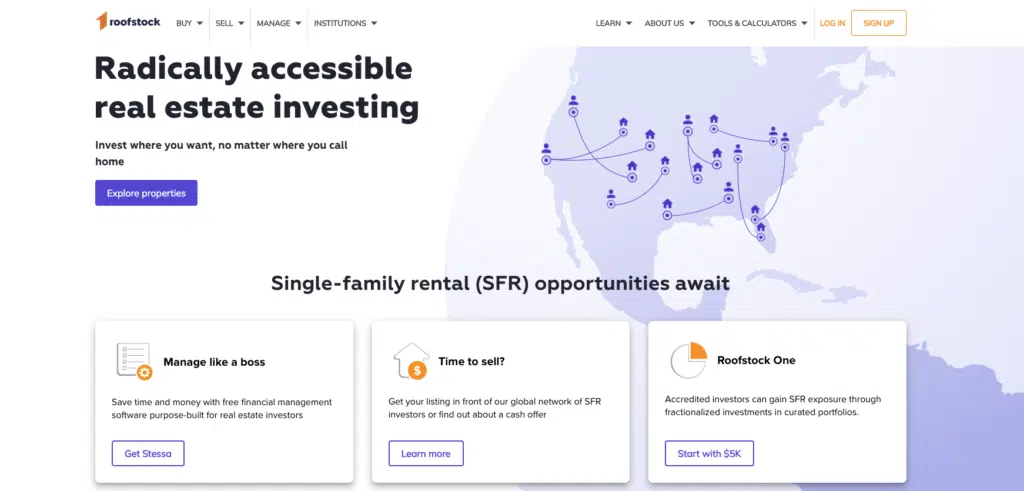
Roofstock lets you invest in rental properties without leaving your home. Its primary service is a marketplace where you can purchase and sell single-family rental properties. Roofstock’s marketplace is free to use so that anyone can search through the different properties offered.
You can uncover all of the information that you need before investing the single-family units, such as
- Newly listed units
- Neighborhood ratings
- Local schools
- Pre-inspection information
- Yield options
Roofstock is one of the most popular investing apps – they’ve already passed over $5 billion in transactions in more than 70 real estate markets. You can read our full Roofstock review for more information.
2. Arrived Homes
Best for Rental Properties
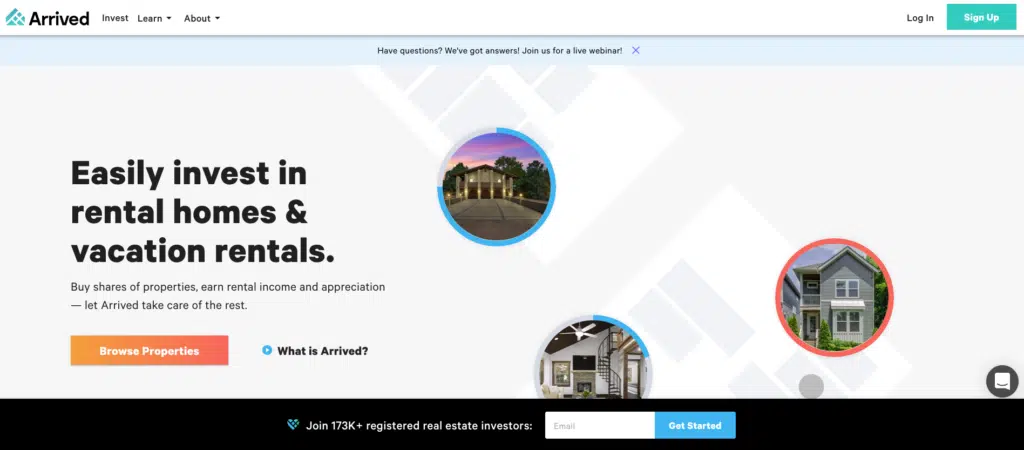
If you’re looking for a simple real estate investing app, you will want to check out Arrived Homes. With this app, you can purchase shares of vacation rentals for as little as $100. As an investor in Arrived Homes, you don’t have to worry about vetting properties, finding tenants, screening guests, or any paperwork involved in purchasing or renting real estate. Instead, you can collect your rental income share quarterly without getting off the couch.
According to Arrived Homes, you can invest in shares of vacation rentals, currently a booming rental market. The website mentions how a permanent vacation rental can bring up to 130% more revenue than a traditional long-term property. The US vacation rental market is also expected to reach $20 billion by 2025.
You earn money with Arrived Homes through passive income and appreciation. The investment team vets every property to ensure it’s up to standards. The company has funded over 190 properties already, charging a 1% asset management fee plus an 8% property management fee and variable sourcing fees.
If you’re looking to test the waters with real estate investing apps, you can start here until you become more comfortable.
Learn more about Arrived Homes
3. Fundrise
Best for Beginners
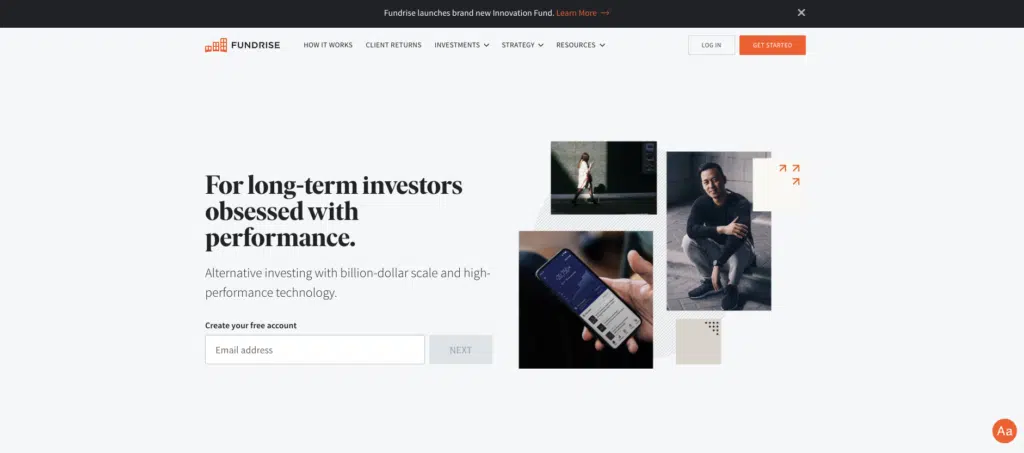
Fundrise prides itself on combining investing expertise with technology to bring investment funds to the 371,000-plus investors on the platform. While many of these opportunities would historically be designated for billion-dollar institutions, you can access them from the comfort of your couch.
Many experts consider Fundrise the best real estate investing app for beginners because you can get started without allocating a significant portion of your savings.
With Fundrise, you can also be a hands-off real estate investor since you don’t have to worry about screening tenants or trying to fix up a place.
Here are some of the main perks of using Fundrise:
- You can get started with a minimum investment of $10 without worrying about saving up for a downpayment.
- There are many options for non-accredited investors.
- You get many offerings and can go through multiple options until you find the right property.
- It has a simple fee structure. Since investing in real estate often comes with a plethora of surprise expenses, it’s a game change to have a platform with a transparent fee schedule.
You can read our full Fundrise review here to learn more about this real estate investing app.
| I’ve been investing with Fundrise since 2018. Disclosure: when you sign up with my link, I earn a commission. All opinions are my own. |
4. RealtyMogul
Best for REITs

RealtyMogul invests in commercial properties to help members finance well-leased properties. It presents the opportunity to invest in REITs to generate passive income.
RealtyMogul has two private REITs for investors that aren’t accredited and additional private real estate investments for accredited investors. The minimum to getting started on the platform is $5,000.
With over 250,000 investors and over $950 million invested on the platform, RealtyMogul has granted exposure to about $5.7 billion in deals. With a wide variety of properties, it’s no secret why this is becoming one of the most user-friendly platforms for real estate investing. Learn more in our RealtyMogul review.
5. CrowdStreet
Best for Commercial Real Estate

If you’re looking for something completely different from the other real estate investing apps on this list, consider CrowdStreet. This app allows accredited investors to include commercial real estate projects in their portfolios.
The minimum investment will vary on every project, but you need at least $25,000 in most cases. You can invest in direct deals on the CrowdStreet marketplace or purchase shares of commercial REITs if that’s what you’re looking for.
CrowdStreet can also work with you in an advisory role so that you have a team that helps you optimize your real estate portfolio with the right deals based on your financial commitment.
As of January 2024, CrowdStreet has over 798 deals funded with $4.2 billion invested. They don’t charge any account fees to investors, and more options are available to qualified investors looking to get serious about building a real estate portfolio.
6. AcreTrader
Best for Farmland

AcreTrader allows you to invest in actual farmland, with various options nationwide, from North Carolina to California. AcreTrader vets every farm before listing it so you can trust the property listing. You don’t have to do anything, as AcreTrader management handles everything from insurance to working with local farmers.
They list about one to two new farms new week, and each listing includes the minimum investment required. One of the recently-listed farms was in Dawson County, Nebraska, with a minimum investment of $10,000 and a specialization in corn and soybeans.
Before investing, you can access all the information you want about the farm. Here’s some of the information that AcreTrader shares:
- Description of the land
- A map of the surrounding area
- Financials and investment highlights
- The photos and documents needed to make an informed investment decision
How can you make money with AcreTrader? The company distributes excess annual income to investors with a yield of 3-5% for the lower-risk properties. AcreTrader also makes money for its investors through land appreciation. When the land is sold, you’ll receive your principal and any appreciation accrued when you held the farmland.
To invest with AcreTrader, you must be an accredited investor willing to keep an illiquid property, meaning you’ll need to hold it for at least 5-10 years. You could also sell your shares through the AcreTrader platform if you would like to exit earlier than that. Check out our full review of AcreTrader for more information.
7. Groundfloor
Best for High Liquidity
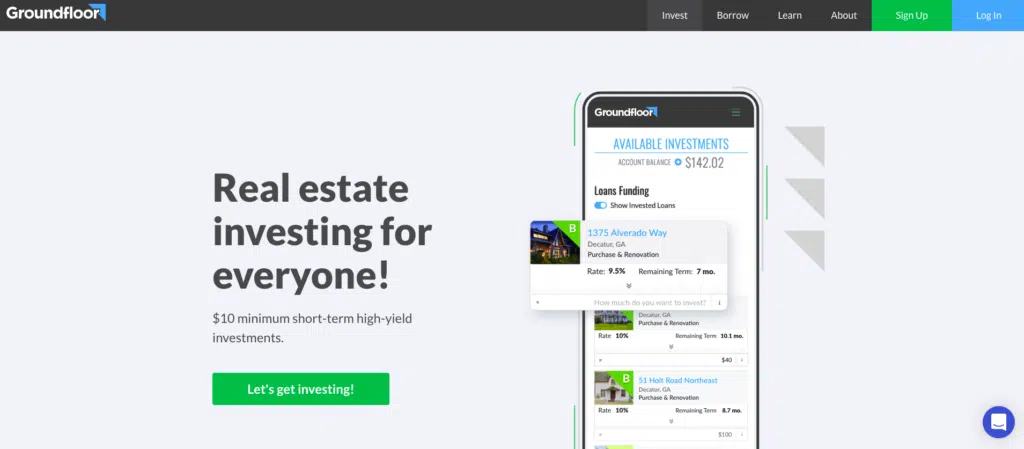
Groundfloor touts that you can get into “savesting” since it combines saving with investing. The company even promises an annual rate of return of 10%, much more than we’ve seen in most other apps. Plus, tangible assets secure your investment in Groundfloor.
How can you use Groundfloor as a real estate investing app?
- You can decide on individual renovation loans that you want to invest in.
- You can use automatic investing tools to keep funding projects that match your preferred criteria.
On average, Groundfloor repays investments every 4-12 months – it’s rare to find such liquidity in a secured investment backed by tangible assets.
You can also take advantage of the savings account offered by Groundfloor. The Stairs product allows you to earn 4% interest on your money with no account minimums, the ability to withdraw at any time, and it’s free to use.
With roughly 200,000 users and over $240 million in assets under management, you can trust your money with Groundfloor.
8. Yieldstreet
Best for Alternative Investments

Yieldstreet is an alternative investment that gives retail investors inside access to unique asset classes traditionally dominated by hedge funds and the wealthy. The private investments can range from multi-family rental properties to expensive art.
Investors without accreditation can invest in Yieldstreet’s Prism Fund for $2,500, while accredited investors can build a custom portfolio for $10,000. The Prism Fund invests in commercial property, consumer, legal, art, and corporate asset classes. This fund comes with a management fee of 1.5%.
If you see yourself as a more sophisticated investor willing to take on more significant risks in pursuing higher returns, consider checking out Yieldstreet.
9. HappyNest
Best for Simplicity
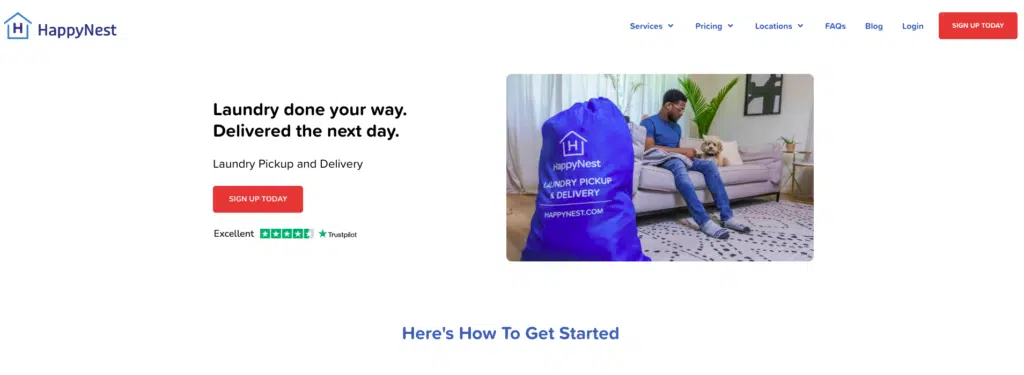
With HappyNest, you can purchase a REIT that will invest your money into commercial real estate. You can get started in only a few minutes with just $10.
HappyNest is a unique platform because lets you use your everyday spending to invest in real estate. You only need to kink your debit or credit card to your HappyNest account. HappyNest will round up every purchase, turning your loose change into shares that earn dividends from real estate.
For example, if you purchase lunch for $8.25, the app will round up to $9 and deposit $0.75 into a pool. When this pool hits $5, HappyNest will automatically invest your money in purchasing more shares. This way, you automatically invest in real estate without changing your spending habits.
HappyNest doesn’t yet have a proven track record like other real estate investing apps on this list. But we included them because of how easy it is to get started. I understand how intimidating it can be to get into real estate investing, and HappyNest is a great place to start.
9 Best Real Estate Investment Platforms for 2024
| Platform | Best For | Key Features |
|---|---|---|
| 1. Roofstock | Best Overall | Invest in Single-Family Rentals Online; $5B+ Transactions |
| 2. Arrived Homes | Best for Rental Properties | Invest in Vacation Rental Shares; Potential 130% Revenue |
| 3. Fundrise | Best for Beginners | Start with $10; Diverse, Hands-Off Real Estate Investments |
| 4. RealtyMogul | Best for REITs | Invest in Commercial Properties via REITs; $5.7B Deals Funded |
| 5. CrowdStreet | Best for Commercial Real Estate | Accredited Investors; Advisory Role; 709 Deals Funded |
| 6. AcreTrader | Best for Farmland | Vetted Farmland; Passive Income and Land Appreciation |
| 7. Groundfloor | Best for High Liquidity | “Savesting” with 10% Return; Short Investment Cycles |
| 8. Yieldstreet | Best for Alternative Investments | Access Unique Asset Classes; Prism Fund for $2,500+ |
| 9. HappyNest | Best for Simplicity | Invest With $10; Use Everyday Spending to Earn Dividends |
With the advent of real estate investing apps, gone are the days when you have to worry about receiving a call from a tenant in the middle of the night or endless paperwork.
Begin Your Real Estate Investment Journey Today
The apps covered in this article are just some of the many ways you can invest in real estate. The main advantage of investing through an app like Roofstoc, Fundrise, or other Fundrise alternatives, is the low barrier to entry compared to purchasing a physical property.
And gone are the days when you have to worry about receiving a call from a tenant in the middle of the night or endless paperwork.
Instead, you can begin your investing journey with $10 while sitting on the couch. Before you sign up, however, take a close look at each real estate app to ensure you invest in the right one. You can do that by reading our individual reviews and checking reviews from other experts and existing users.








Leave a Reply